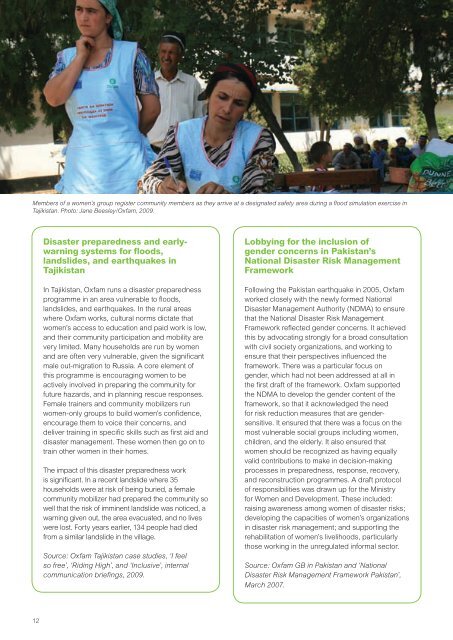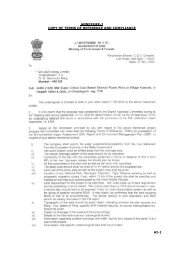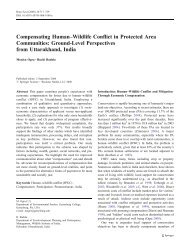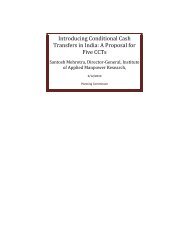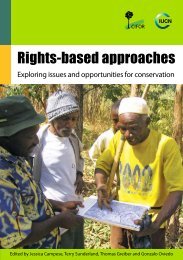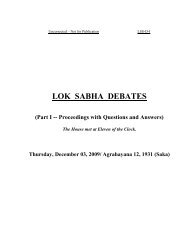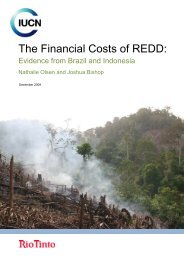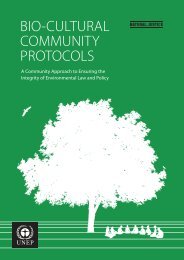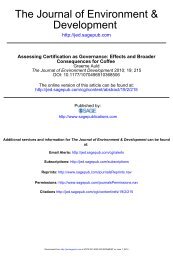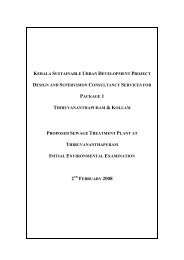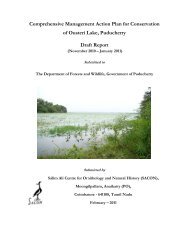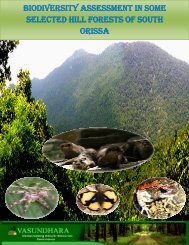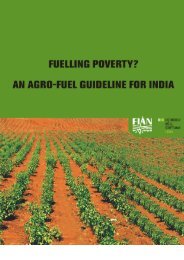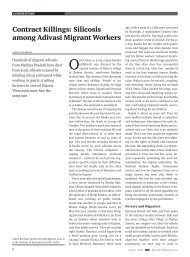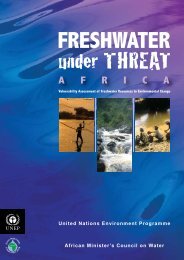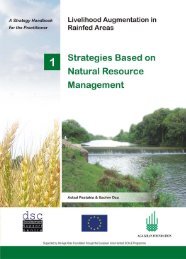Gender, Disaster Risk Reduction, and Climate Change Adaptation
Gender, Disaster Risk Reduction, and Climate Change Adaptation
Gender, Disaster Risk Reduction, and Climate Change Adaptation
Create successful ePaper yourself
Turn your PDF publications into a flip-book with our unique Google optimized e-Paper software.
Members of a women’s group register community members as they arrive at a designated safety area during a flood simulation exercise in<br />
Tajikistan. Photo: Jane Beesley/Oxfam, 2009.<br />
<strong>Disaster</strong> preparedness <strong>and</strong> earlywarning<br />
systems for floods,<br />
l<strong>and</strong>slides, <strong>and</strong> earthquakes in<br />
Tajikistan<br />
In Tajikistan, Oxfam runs a disaster preparedness<br />
programme in an area vulnerable to floods,<br />
l<strong>and</strong>slides, <strong>and</strong> earthquakes. In the rural areas<br />
where Oxfam works, cultural norms dictate that<br />
women’s access to education <strong>and</strong> paid work is low,<br />
<strong>and</strong> their community participation <strong>and</strong> mobility are<br />
very limited. Many households are run by women<br />
<strong>and</strong> are often very vulnerable, given the significant<br />
male out-migration to Russia. A core element of<br />
this programme is encouraging women to be<br />
actively involved in preparing the community for<br />
future hazards, <strong>and</strong> in planning rescue responses.<br />
Female trainers <strong>and</strong> community mobilizers run<br />
women-only groups to build women’s confidence,<br />
encourage them to voice their concerns, <strong>and</strong><br />
deliver training in specific skills such as first aid <strong>and</strong><br />
disaster management. These women then go on to<br />
train other women in their homes.<br />
The impact of this disaster preparedness work<br />
is significant. In a recent l<strong>and</strong>slide where 35<br />
households were at risk of being buried, a female<br />
community mobilizer had prepared the community so<br />
well that the risk of imminent l<strong>and</strong>slide was noticed, a<br />
warning given out, the area evacuated, <strong>and</strong> no lives<br />
were lost. Forty years earlier, 134 people had died<br />
from a similar l<strong>and</strong>slide in the village.<br />
Source: Oxfam Tajikistan case studies, ‘I feel<br />
so free’, ‘Riding High’, <strong>and</strong> ‘Inclusive’, internal<br />
communication briefings, 2009.<br />
Lobbying for the inclusion of<br />
gender concerns in Pakistan’s<br />
National <strong>Disaster</strong> <strong>Risk</strong> Management<br />
Framework<br />
Following the Pakistan earthquake in 2005, Oxfam<br />
worked closely with the newly formed National<br />
<strong>Disaster</strong> Management Authority (NDMA) to ensure<br />
that the National <strong>Disaster</strong> <strong>Risk</strong> Management<br />
Framework reflected gender concerns. It achieved<br />
this by advocating strongly for a broad consultation<br />
with civil society organizations, <strong>and</strong> working to<br />
ensure that their perspectives influenced the<br />
framework. There was a particular focus on<br />
gender, which had not been addressed at all in<br />
the first draft of the framework. Oxfam supported<br />
the NDMA to develop the gender content of the<br />
framework, so that it acknowledged the need<br />
for risk reduction measures that are gendersensitive.<br />
It ensured that there was a focus on the<br />
most vulnerable social groups including women,<br />
children, <strong>and</strong> the elderly. It also ensured that<br />
women should be recognized as having equally<br />
valid contributions to make in decision-making<br />
processes in preparedness, response, recovery,<br />
<strong>and</strong> reconstruction programmes. A draft protocol<br />
of responsibilities was drawn up for the Ministry<br />
for Women <strong>and</strong> Development. These included:<br />
raising awareness among women of disaster risks;<br />
developing the capacities of women’s organizations<br />
in disaster risk management; <strong>and</strong> supporting the<br />
rehabilitation of women’s livelihoods, particularly<br />
those working in the unregulated informal sector.<br />
Source: Oxfam GB in Pakistan <strong>and</strong> ‘National<br />
<strong>Disaster</strong> <strong>Risk</strong> Management Framework Pakistan’,<br />
March 2007.<br />
12


